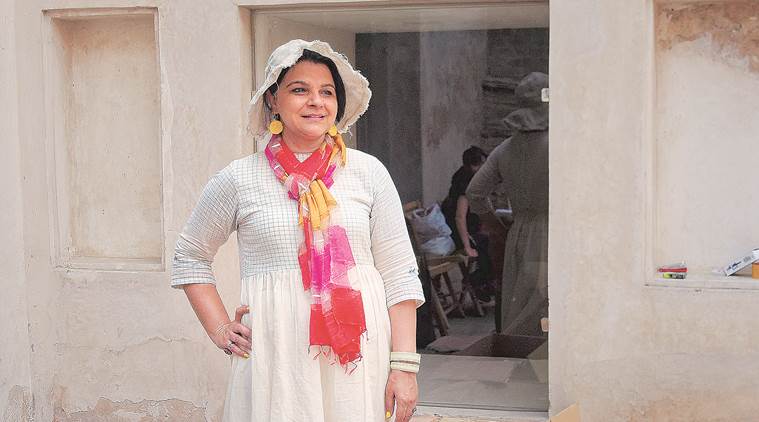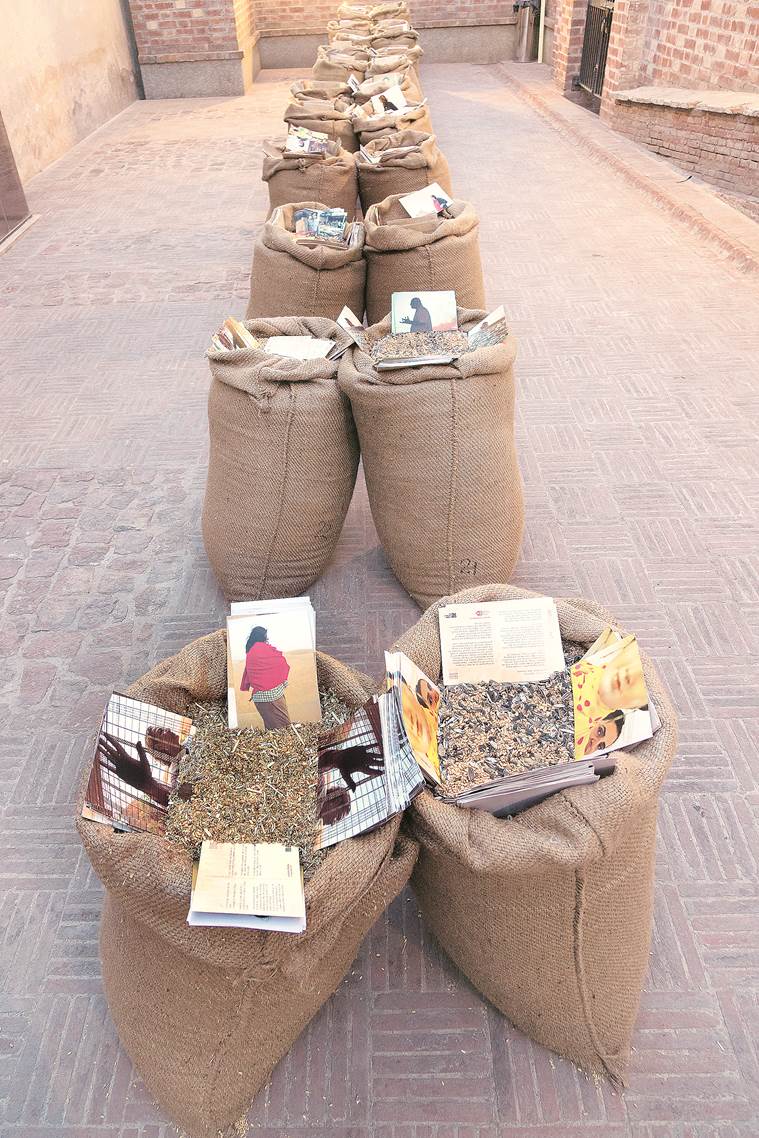 Manisha Gera Baswani (Express photo by Atif Saeed)
Manisha Gera Baswani (Express photo by Atif Saeed)
Artist Manisha Gera Baswani’s father was 14 when he left his hometown of Sargodha to live a new life in India. Her mother was eight, when she fled from Fort Sandeman, a city on the banks of the Zhob river in Balochistan, to find a new home in Delhi. Baswani fondly recalls how her parents would narrate tales from across the border — her mother walking “hand in hand to school with Kanees Fatima, her friend”, and her father learning “the art of trapping and training falcons and hunting quails”. Gradually, these memories became Baswani’s own, as she imagined her parents as young children, oblivious to how their life changed with Partition. “I grew up with these stories,” says Baswani. She knew that several other lives were impacted, just as theirs, but a visit to Pakistan led her to start documenting these stories. “I had started photographing Pakistani artists long ago, but gradually I realised that everyone there had stories to share about India, about their ancestors. They spoke about their India connect,” says Baswani, 50.
Keen to document similar stories across the border, she started contacting her friends and associates in the art community, in January 2018, to pen personal memories of Pakistan. The response, the artist says, has been overwhelming. “I found more than what I had thought,” says Baswani. She shared some of these on printed postcards that also bear photographs of the artists. On view at Lahore’s historic Shahi Hammam as part of the recent Lahore Biennale, the project ‘Postcards From Home’ featured 47 artists from across the border — 22 Pakistani and 25 Indian. Thousands of postcards were filled in wheat sacks, that visitors could choose from and take back with them. The accounts range from artists like Monica Narula and Roohi Ahmed narrating accounts shared by families, to first-hand recollections from Nilima Sheikh and Gopi Gajwani. If Paramjit Singh recalls getting his first ainak from Haji ji’s optical shop in Lahore as an eight year old, Krishen Khanna narrates how he and his wife Renu were neighbours near Government College in Lahore, where they played hide -and-seek in Goldberg garden as children, only to be married post-Partition, in 1950. Curator Salima Hashmi, daughter of Urdu poet and author Faiz Ahmad Faiz, shares vivid memories of playing in Lodhi Gardens at four, and Meher Afroz recalls how her father, Farzand Husain, took her with him in a tonga to admit her to the arts college in Lucknow.
 Baswani got Indian and Pakistani artists to talk about their stories, which were printed on postcards, and tucked in wheat sacks, for visitors to take back with them
Baswani got Indian and Pakistani artists to talk about their stories, which were printed on postcards, and tucked in wheat sacks, for visitors to take back with them
“People might have fled but when they recall their memories of home there is no bitterness. Their recollections bring a smile. There is so much positivity,” says Baswani. Flipping through the postcards, she also notes how these are also documentation of experiences that perhaps will soon become a distant past with the passing away of the generation that lived the Partition. She recalls how Pakistani artist Aisha Khalid spoke to her father Khalid Hussain only a few days before the opening of the Biennale, and through the conversation learnt that her grandfather was not just a poet, as was known to her, but also a magistrate. Her father died a few days later. In the postcard, she recalls how he migrated from Kapoorthala to Lahore, and “never asked for any compensation for the land he had owned and lost in pre-Partition India”.
The narrative also chronicles the times. For instance, Sonia Khurana recalls how her maternal grandmother, Yashoda Rani Arya, was among the first batch of women to study medicine at Lahore Medical college, and often bunked college to travel from village to village to “spread the message of Swaraj”.
There are also tales of longing and yearning. Dabir Ahmad recalls how even after 70 years he still remembers how he left his birth place, Garhi Harsaro, near Gurgaon. Karachi-based Ahmed Khan fondly recalls his home in Shahjahanpur. “I can still re-live the taste of puri-halwa my dear friend Naval Kishore’s mother used make for me,” he tells Baswani. Satish Gujral, who was 21 when he migrated to India, is certain: “None my age who is alive today, on either side of the border, knows Lahore like I do”.
Gargi Raina, meanwhile, has carefully kept the joda (garment given to a daughter on her first trip back home after marriage) gifted to her by Shaukat Kang, a village elder in Ajudhyapu, her father’s native place, that she visited in 2001. For Baswani, meanwhile, the project is a gift to her parents, and also that she intends to expand and travel with.